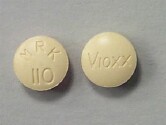
TUESDAY, Nov. 22 (HealthDay News) — The U.S. Justice Department said Tuesday that the drug company Merck will pay $950 million to resolve investigations into its marketing of the blockbuster painkiller Vioxx, which was pulled from the market in 2004 after studies revealed the drug increased users’ risks of heart attack and stroke.
Merck will pay $321.6 million in criminal fines and $628.4 million as a civil settlement. The company will also plead guilty to a charge of marketing Vioxx as a treatment for rheumatoid arthritis before the U.S. Food and Drug Administration granted such approval, the Associated Press reported.
In a statement on its website, Merck said the civil settlement did not constitute an admission of liability or wrongdoing.
“We believe that Merck acted responsibly and in good faith in connection with the conduct at issue in these civil settlement agreements, including activities concerning the safety profile of Vioxx,” said Bruce N. Kuhlik, executive vice president and general counsel of Merck.
In November 2007, Merck agreed to pay $4.85 billion to settle approximately 50,000 lawsuits from plaintiffs who said they or family members were injured or had died after taking Vioxx.
Vioxx was approved as a painkiller by the FDA in May 1999, but the government did not initially approve the drug for rheumatoid arthritis. As a result, doctors could prescribe Vioxx for patients with rheumatoid arthritis, but Merck couldn’t market the drug for that use. The FDA approval for rheumatoid arthritis came in April 2002, the AP reported.
But the Justice Department said Merck marketed and promoted Vioxx for rheumatoid arthritis for three years, even after getting a warning letter from the FDA in September 2001, the news service said.
As part of Tuesday’s settlement, Merck also entered into an agreement concerning its sales, marketing, publication, and pricing activities. The Justice Department said the agreement strengthens oversight of the company, since it will require senior company officials to complete annual compliance certifications, and the company must post information about physician payments on its website, according to the AP.
Vioxx was initially part of a trio of drugs called cox-2 inhibitors, which also included Bextra and Celebrex. These drugs were at first hailed as a means of treating pain without causing gastrointestinal problems like bleeding, as can happen with related analgesics known as nonsteroidal anti-inflammatory drugs (NSAIDs).
NSAIDs include cox-2 inhibitors and common over-the-counter drugs, such as ibuprofen (Advil, Motrin), naproxen (Aleve), and aspirin.
But, the cox-2-mediated stomach protection came at a price. In September 2004, Vioxx was pulled from the market after studies showed its long-term use was linked to an increased risk for heart attacks. In April 2005, Bextra was pulled because of similar fears, as well as evidence of increased risks for a rare but potentially fatal skin reaction.
Celebrex remains the only cox-2 inhibitor sold in the United States, and its label carries a black-box warning detailing potential heart risks.
In December 2005, the editors of the New England Journal of Medicine accused researchers and Merck of withholding key heart risk data that showed up in one of the first large trials of Vioxx. The findings from that trial were published in the journal. Specifically, the editors charged that a study published in November 2000 was submitted to the journal after information about three heart attacks among Vioxx trial participants had been deleted by Merck, which funded the study.
In a statement at the time quoted by the AP, Merck said the additional heart attacks “did not materially change any of the conclusions of the article.” Merck also said the additional heart attack data was not included in the study because the heart attacks were reported after Merck’s cut-off date for including study data.
More information
For more on cox-2 inhibitors, including Celebrex (celecoxib), visit the U.S. National Institutes of Health.

